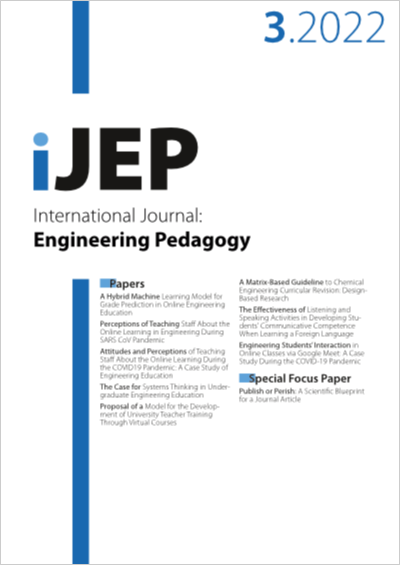Attitudes and Perceptions of Teaching Staff About the Online Learning During the COVID19 Pandemic: A Case Study of Engineering Education
DOI:
https://doi.org/10.3991/ijep.v12i3.29947Keywords:
online learning during COVID19 pandemic, emergency online learning, university online teaching-learning, engineering education, teaching staffAbstract
For a long time, the online learning (OL) was reserved for a particular group of learners: mostly older people with multiple family, work, financial and other responsibilities. These students benefited from the opportunities offered by this type of educational modality compared to traditional face-to-face education. However, the emergence of the Sars CoV virus (and its derivatives) not only generated health problems, but also affected social structures, generating various problems in the field of education The general objective of the present research is to know the perceptions and evaluations that academic teaching staff from a engineering faculty have about the emergency online teaching-learning process that occurred in the context of the COVID 19 pandemic. Based on several previous works related to online learning (OL) and recently in the literature on emergency online learning (EOL), an instrument (questionnaire) was developed and implemented with the participation of teachers from a Chilean university. The research is quantitative-descriptive and had the following specific objectives: To know about (1) the readiness of the teaching staff towards the OL and (2) their interactions with others, to characterize (3) the use of different Self-management skills and (4) the interaction with LMS and ICTs., and (5) to know about the available resources for OL. In general, the results show that teaching staff show mastery in aspects related to self-management of learning, but a low level of motivation and readiness for OL and a "loss" in aspects related to interaction with others (students and peers). These results provide a first approximation to university teachers ' perceptions of OL and allow us to identify several aspects that should be improved. This research was financially supported by DAAD (Project Nr. 57334905).
Downloads
Published
How to Cite
Issue
Section
License
Copyright (c) 2022 Diego Gormaz Lobos, Claudia Galarce-Miranda, Steffen Kersten, Hanno Hortsch

This work is licensed under a Creative Commons Attribution 4.0 International License.


